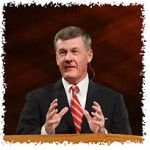 The following excerpt is adapted from Foundations of Grace by Steven J. Lawson.
The following excerpt is adapted from Foundations of Grace by Steven J. Lawson.
Through the western regions of North America, there runs an imaginary geographic line that determines the flow of streams into oceans. It is known as the Continental Divide. Ultimately, precipitation falling on the east side of this great divide will flow into the Atlantic Ocean. Likewise, water falling on the western slopes of this line will surge in the opposite direction until it finally empties into the Pacific Ocean. Needless to say, a vast continent separates these immense bodies of water. It is seemingly far-fetched to ponder that a raindrop falling atop a mountain in Colorado will flow to the Pacific, while another drop, falling but a short distance away, will flow into the Atlantic. Nevertheless, once the water pours down on a particular side of this great divide, its path is determined and its direction is unchangeable.
Geography is not the only place we find a great divide. There is a high ground that runs through church history as well—a Continental Divide of theology. This great divide of doctrine separates two distinctly different streams of thought that flow in opposite directions. To be specific, this determinative high ground is one’s theology of God, man, and salvation. This is the highest of all thought, and it divides all doctrine into two schools. Historically, these two ways of thinking about God and His saving grace have been called by various names. Some have identified them as Augustinianism and Pelagianism. Others have named them Calvinism and Arminianism. Still others have defined them as Reformed and Catholic, while others have used the terms predestination and free will. But by whatever name, these streams are determined by the Continental Divide of theology.
This metaphorical divide differs from the geographical Continental Divide in one key respect. Whereas streams flowing west and east of the Rocky Mountains descend gradually to the plains and lowlands where they meet the oceans, the terrain on the two sides of the doctrinal divide is quite different. On one side we find solid highlands of truth. On the other side there are precipitous slopes of half-truths and full error. Continue reading

